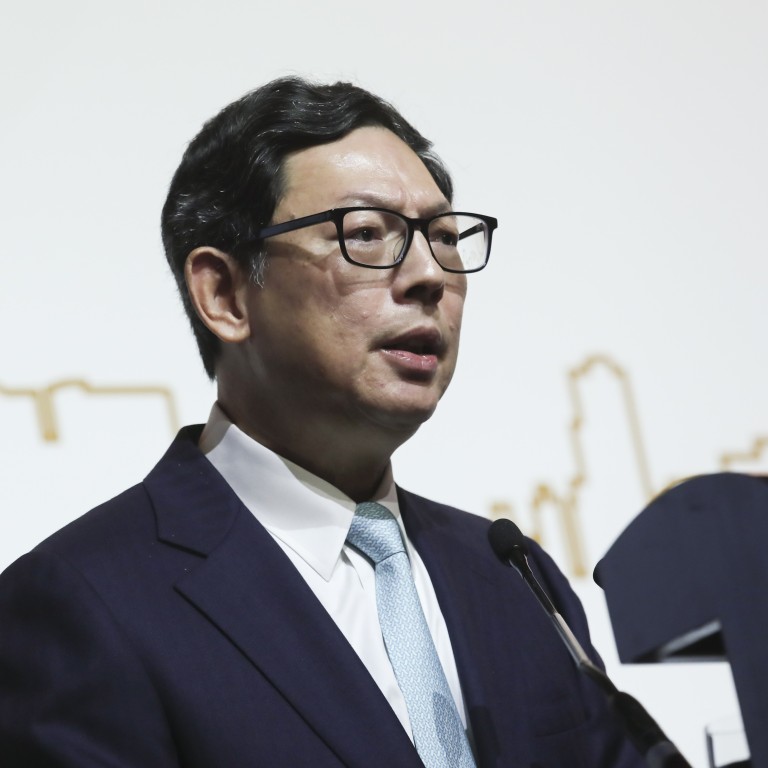
Hong Kong’s de facto central bank raises base interest rate by 25 points for fourth time this year in lockstep with US monetary policy
- Hong Kong Monetary Authority’s move is in lockstep with US Federal Reserve’s overnight action to maintain the local dollar’s peg to the US dollar
- Relief for mortgage holders as banks say they will not raise their best lending rates
The Hong Kong Monetary Authority (HKMA) has raised the city’s base lending rate by 25 basis points for the fourth time this year, moving in lockstep with the US Federal Reserve’s overnight increase of the same quantum, to maintain the local currency’s peg to the US dollar.
The four quarter-point increases have added 1 full percentage point to Hong Kong’s base lending rate, at 2.75 per cent with immediate effect.
Hong Kong’s currency has been pegged to the US dollar at HK$7.8 per dollar since 1983, which compels the de facto central bank to mirror the US Fed’s monetary policy to maintain the currency’s stability.
The HKMA chief executive, Norman Chan Tak-lam, said on Thursday morning the public needed to manage risks and prepare for an economic downturn and market volatility in 2019, as interest rates will continue to rise.
“The banks that relied on interbank funding will feel the heat, and they may increase their best lending rate. This will add to costs for mortgage and other borrowers,” said Chan. “The expected interest rate rises next year, together with the US-China trade war and Brexit, will all add risks to an economic downturn and volatile stock and property markets.
“The Hang Seng Index has been down 25 per cent from its peak earlier before stabilising recently. It is still down more than 10 per cent year to date. The public needs to have risk management to prepare for these downturns,” he added.
Most of the city’s banks released statements on Thursday saying they would keep their best lending rates unchanged for now. That means for HSBC, Hang Seng Bank and Bank of China (Hong Kong) the rate will stay at 5.125 per cent, while for Standard Chartered Bank and DBS it will continue at 5.375 per cent.
That will come as a relief to homeowners, who would face higher mortgage payments in the event of an increase in their banks’ prime rates.
Asia-Pacific stock markets fell across the board on Thursday after the US interest rate rise, with Japan down the most at 3 per cent. Australia lost 1.4 per cent, Taiwan was down 1.1 per cent and South Korea dropped 1 per cent.
Hong Kong’s benchmark Hang Seng Index lost 1 per cent to close at 25,623.53, while in mainland China, the Shanghai index was down 2.2 per cent and Shenzhen closed 2.6 per cent lower.
The US dollar strengthened against many currencies. The onshore yuan was weaker by 0.1 per cent, the Swiss Franc fell by 0.4 per cent and the Japanese yen slid 0.6 per cent.
Chan said that while some analysts believed the US Fed’s interest rate increase on Wednesday would be the last of this cycle, the US central bank had forecast two more rate increases next year: “This shows the interest rate rise cycle has not yet ended,” he said. Chan pointed out that the one-month Hibor interbank interest rate had now reached 2.4 per cent, twice its level at the end of last year. Some banks are now offering 2.7 per cent for three-month time deposits.
This timeline for increases was backed by some analysts, who think an escalating US-China trade war may compel the US Fed to spread out its pace of three increases into 2020.
“Given [that] recent macroeconomic data are still relatively stable, any change in policy rate expectation by the [US Fed] could be seen as the Fed paying more attention to potential warning signals, including a flatter yield curve and wider corporate credit spreads,” Tai Hui, chief market strategist for Asia-Pacific, JPMorgan Asset Management, had said before the HKMA’s move. “Given the cautious market sentiment, a slower pace of rate rises could be interpreted as a sign of weakness and put more pressure on risk assets.”
Negative equity returns to Hong Kong as small, older flats’ values drop by 20 per cent in a declining market
An increase in the base lending rate has translated into higher mortgage payments for Hong Kong’s borrowers, as lLocal commercial banks in September raised their prime rates by 12.5 basis points for the first time in 12 years, ending an era of cheap loans in the city.
For a typical HK$4 million, 30-year loan priced at prime minus 2.75 per cent, a 12.5-point increment would raise the mortgage payments by HK$256 every month to HK$15,546, according to broker Ricacorp Mortgage. Hong Kong had up to HK$1.26 trillion (US$160 billion) in outstanding mortgage loans as at the end of June.
The HKMA’s Chan reiterated on Thursday the de facto central bank would relax mortgage rules if a downturn in Hong Kong’s property market is confirmed.
“It is true, there is some cooling off in the property market, but we cannot be sure if it is just a short-term phenomenon. We need more time to confirm it is on a long-term down cycle before we can remove our mortgage policies,” he said.

